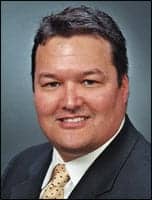Despite the economic downturn, patients can be guided to the hearing help they need when your team radiates a helpful mind-set with no preconceptions. Your patients should not have to wait for the economy to improve before improving their hearing health and lifestyle.

|
| Paul Findly, MBA, is director of marketing at CareCredit, Costa Mesa, Calif. |
Initially, the economy’s impact on your practice may not have been dramatic. Sales were still good through most of 2008. But in the third quarter of last year, hearing aid sales fell as the effects of the fluctuations in the stock market began to affect your patients.
Assets in retirement accounts typically hold less in stocks and are therefore affected less by the market. Still, reports indicate that these accounts—many of your patients’ accounts—have lost 32% of their value.
Unfortunately, the difference is with households nearing or at retirement age, more than likely their income is fixed, so the opportunity to add to their savings is minimal. And they have less time to wait for the market to recover. The only way these patients can adjust to the loss of their retirement income is by cutting expenses—including hearing aids.
How you communicate with patients during this challenging time will determine sales and long-term loyalty.
Step One: Don’t Reflect, Realize
Communicating effectively with patients begins with you and your team’s own feelings and perceptions about money and the economy. It’s important that you don’t transfer or reflect any negative emotions you may have based on how the economy is affecting you or people you know. Because the reality is, if you are fearful and are focusing on spending less, as many Americans are now doing, your ability to genuinely recommend several thousand dollars in hearing aid technology may be difficult—primarily because you do not have hearing loss and cannot attach the same value to hearing instruments as your patients can.
Effective communication starts by realizing that patients shouldn’t have to wait for the economy to improve before improving their hearing health and lifestyle. That sentence is worth repeating:
Patients shouldn’t have to wait for the economy to improve before improving their hearing health and lifestyle.
You may want to post this sentence around your practice so your entire team understands just how important the service you provide is to patients’ ability to live a vital and connected life.
Step Two: Don’t Assume, Ask
Now that you and your team have the right mind-set, it’s important that you don’t assume all patients have cost concerns—even with the economy consistently in the headlines. Many don’t. Fortunately, a significant portion of the mature market has always had the propensity to save and have subsequently accumulated wealth over their lifetimes.
So, don’t immediately begin offering discounts or assume that the best technology is not appropriate for the patient. Conversely, don’t assume because the patient doesn’t ask for financing that they can comfortably pay. Many won’t proactively ask about payment options; they will just leave the practice to “think about it,” or “discuss it with their spouse.” Only the patient knows their desire to buy and their budget—unless you ask.
Uncovering a patient’s financial concerns and situation takes exceptional communication skills—specifically, empathy and the ability to ask open-ended questions. Ideally, you want to control this portion of the conversation—not avoid it. Here are a few open-ended questions that can help you ascertain the patient’s desire to buy, how ready they are to make a decision, and their budget.
“How long have you been concerned with your hearing health?”
“Have you been to see any other hearing care professionals recently to get your hearing tested?” If yes, ask, “What stopped you from buying hearing aids then?”
“Did you have a budget in mind for your hearing investment?”
Step Three: Don’t Avoid, Acknowledge
Of course, there will be patients who immediately express cost concerns, even during the initial telephone call. When patients ask, don’t avoid the conversation by being vague. Answers like “We can’t tell you the cost until you complete an examination” sound evasive and can quickly turn a warm prospective patient cold.
When a patient immediately asks about cost, your task is to uncover if cost is their true concern, or just the excuse they use to justify their denial of their own hearing loss. As you know, most patients with hearing loss wait close to 10 years before they even seek a consultation. During that initial call, they may be looking for any and every excuse not to come in for an examination.
To communicate effectively with a caller whose first question revolves around cost, you must first answer their concern, let them know that they may indeed be right—they may not need a hearing aid—and then finally, take control of the conversation to uncover their true needs.
For example:
Office Staff: Hello, XYZ Hearing. This is Jane, how can I help you?
Caller: Yes, I was wondering, how much are your hearing aids?
Office Staff: They range from several hundred to several thousand dollars depending on the type of hearing aid. It sounds like you might be concerned a bit with cost. The good news is we have several payment options designed to fit almost any budget. But before we can even talk about cost, we need to perform a hearing test to determine if you actually need a hearing aid. Are you available to meet with the doctor next Thursday? Are you available at 10 am?”
When a patient expresses concerns with cost after the examination and hearing instrument recommendation, it’s important to discuss their fears.
Office Staff: “Mrs Smith, your investment in your hearing health will be about $2,500.”
Caller: “Oh. I don’t know if I want to spend that with the way the economy is.”
Office Staff: “I’m sorry to hear that, Mrs Smith. I can understand why that might cause you to be cautious with your spending. Mrs Smith, the hearing technology we are recommending will help you in those situations you mentioned that are important to you—like church and restaurants. We have available No Interest Payment Plans, which would allow you to get the best hearing health and comfortably pay over time. This way you don’t have to pay all up front and will have money available for the activities you enjoy. You shouldn’t have to wait for the economy to improve before you improve your hearing health. Can I tell you more about this payment option?”
Using the right communications skills and proactively asking open-ended questions to determine where patients are in their decision-making process and their mind-set on cost—without assuming they need a discount or don’t need a payment plan—will help you effectively talk with patients and sell more hearing instruments during any economy.
Correspondence can be addressed to [email protected] or Paul Findly at .
Citation for this article:
Findly, P. How to Talk to Patients About Costs in Today’s Economy. Hearing Review. 2009;16(4):42-43.




